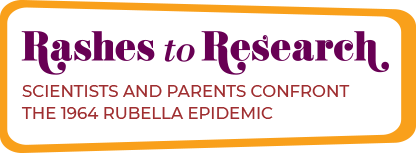Author: Ashley Bowen, PhD is a Mellon/ACLS Public Fellow at the Science History Institute in Philadelphia and a guest curator at the National Library of Medicine. Her research focuses on nineteenth century public health and medicine, the material culture of medicine, and representations of patient experience. She served as a Brown-Wheaton Faculty Fellow and held a pre-doctoral fellowship at the Smithsonian Institution’s National Museum of American History. Her scholarship has also been supported by the F. C. Wood Institute for the History of Medicine at the College of Physicians Philadelphia.
Suggested Use: The “Rubella Mothers as Moral Pioneers” module is a companion to the website and exhibition Rashes to Research: Scientists and Parents Confront the 1964 Rubella Epidemic. This module, for use in colleges and university courses, encourages students to examine in detail how the 1964 rubella epidemic reshaped cultural ideas about the “ideal” American family. It offers students the opportunity to discuss how gender, science, and disability reframed ideas about responsible and respectable parenting.
Instructors can use this module to introduce students to the history of science, medicine, and gender in the mid-20th century. Each class, designed for flexible use in 50 to 90-minute class periods, includes a short introduction, primary and secondary sources, and discussion questions. The sources range from recent scholarly works in the history of medicine to primary sources written by historical figures to oral histories, visual materials, and films. The readings, visual materials, overviews, and questions in this lesson plan will challenge students to think about the dynamic relationship between popular culture, disability, gender, and epidemic disease. This module is appropriate for college or university courses ranging from US history surveys to upper division courses on the history of science and/or medicine, gender studies, disability studies, or public health.
In addition to the readings assigned in each class module, instructors may find the following books, articles, and blog posts useful in their preparation:
Daly, Jeff. Where’s Molly. DVD, Documentary, 2007. http://www.wheresmolly.net/main.html
Greenlee, Cynthia R. “Race, Rubella, and the Long Road to Abortion Reform.” Scalawag, February 18, 2016.
Jesudason, Sujatha, and Julia Epstein. “The Paradox of Disability in Abortion Debates: Bringing the pro-Choice and Disability Rights Communities Together.” Contraception 84, no. 6 (December 2011): 541–43.
LaFrance, Adrienne. “What Zika Researchers Can Learn from the Rubella Outbreak of 1964: The Viruses Have Key Similarities That May Help Scientists Respond to a Possible Epidemic.” The Atlantic, April 6, 2016. https://www.theatlantic.com/health/archive/2016/04/zika-rubella/477165/
Lyerly, Anne Drapkin, Samantha G. Robin, and Elana Jaffe. “Rubella and Zika Vaccine Research—A Cautionary Tale About Caution.” JAMA Pediatrics 171, no. 8 (August 1, 2017): 719–720.
Martinez-Palomo, Adolfo. “Revisiting Zika (and Rubella).” Journal of Public Health Policy 37, no. 3 (August 2016): 273–76.
Plant, Rebecca Jo. Mom: The Transformation of Motherhood in Modern America. Chicago: University of Chicago Press, 2012.
Plotkin, Stanley A. “The History of Rubella and Rubella Vaccination Leading to Elimination.” Clinical Infectious Diseases 43, Supplement 3 (2006): S164–68.
Reiter, Rayna R. Testing Women, Testing the Fetus: The Social Impact of Amniocentesis in America. The Anthropology of Everyday Life. New York: Routledge, 1999.
Smith, S. E. “When It Comes to Zika and Abortion, Disabled People Are Too Often Used as a Rhetorical Device.” Rewire News, August 18, 2016. https://rewire.news/article/2016/08/18/comes-zika-abortion-disabled-people-often-used-rhetorical-device/
Solinger, Rickie. Pregnancy and Power: A Short History of Reproductive Politics in America. New York: New York University Press, 2005.
Taylor, Janelle S. “Of Sonograms and Baby Prams: Prenatal Diagnosis, Pregnancy, and Consumption.” Feminist Studies 26, no. 2 (2000): 391–418. https://doi.org/10.2307/3178541
Vanderberg-Daves, Jodi. “Twentieth-Century American Motherhood: Promises, Pitfalls, and Continuing Legacies.” The American Historian, November 2016. http://tah.oah.org/november-2016/twentieth-century-american-motherhood-promises-pitfalls-and-continuing-legacies/
Wendt, Diane. “Combating Infectious Disease and Slaying the Rubella Dragon, 1969–1972.” Blog of the Smithsonian Institution’s National Museum of American History. O Say Can You See? (blog), October 19, 2015. http://americanhistory.si.edu/blog/combating-infectious-disease-and-slaying-rubella-dragon-1969-1972
Academic Goals: After completing a unit or the entire module, students will be able to
- Analyze primary and secondary sources
- Explain the dynamic relationship between scientific knowledge and cultural change
- Use popular culture to explore medical history
- Apply insights from historical case studies to current events






